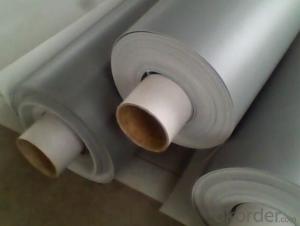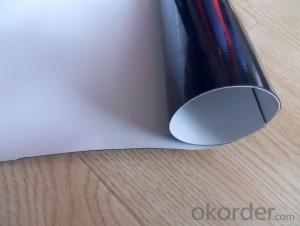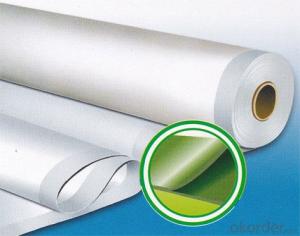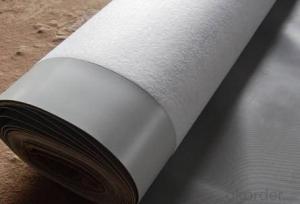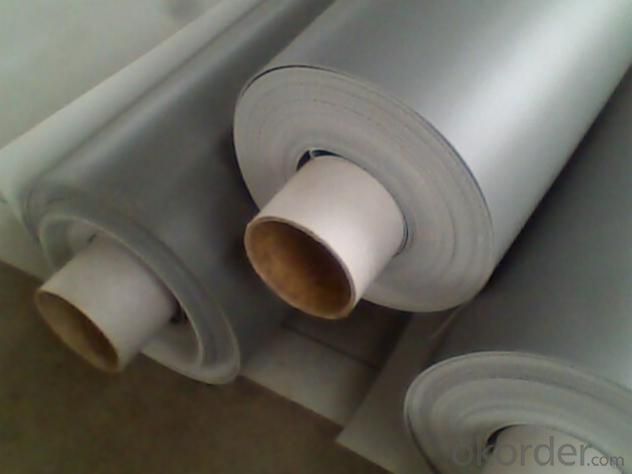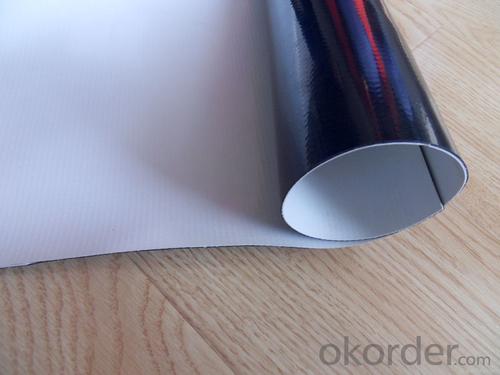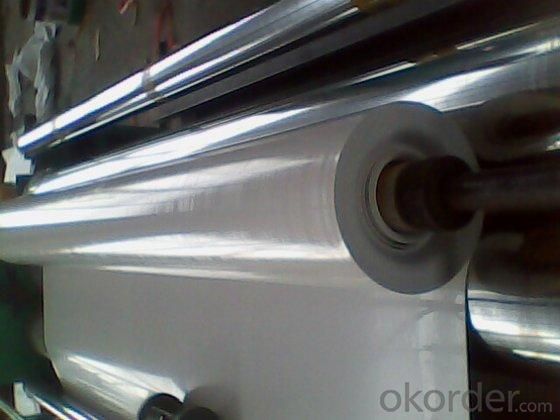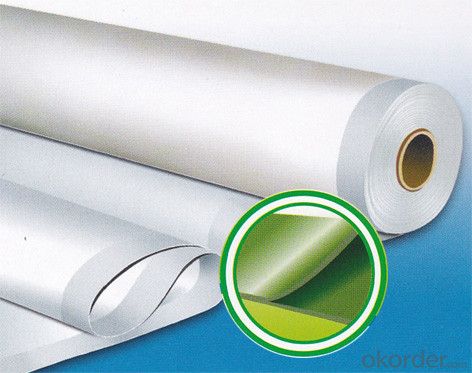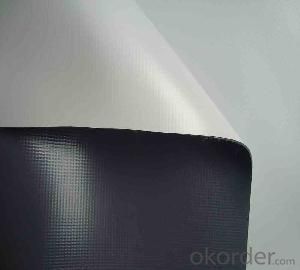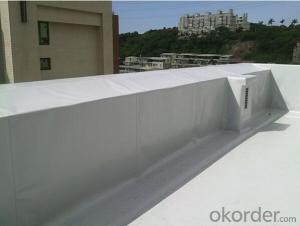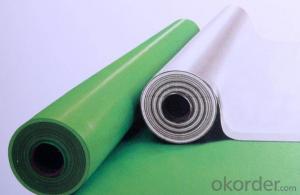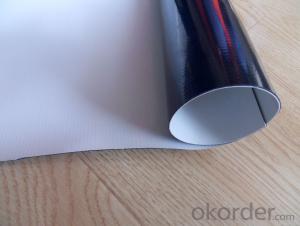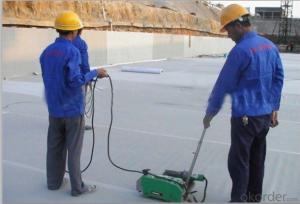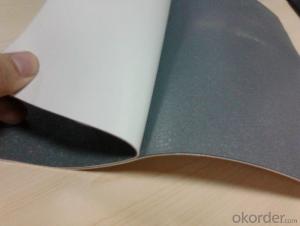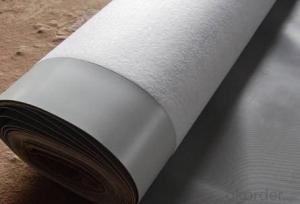PVC Waterproofing Sheet in Polyester Reinforcement in 1.2mm
- Loading Port:
- Shanghai
- Payment Terms:
- TT OR LC
- Min Order Qty:
- 20000 m²
- Supply Capability:
- 5000000 m²/month
OKorder Service Pledge
OKorder Financial Service
You Might Also Like
PVC Waterproofing Sheet in Polyester Reinforcement in 1.2mm
Product Description of PVC Waterproofing Sheet in Polyester Reinforcement in 1.2mm:
PVC Membrane Waterproof /Waterproofing membrane For Roof is a new polymer waterproof membrane. The PVC Membrane Waterproof /Waterproofing membrane For Roof raw material is polyvinyl chloride resin, mixed with plasticizer, filler, antioxygen, ultraviolet absorber and other auxiliaries.
Thickness: 1.2mm/1.5mm/1.8mm/2.0mm
Width:2050mm
Length:20m( Special specifications can be customized)
Size: 2.05mx20m
Color: white/grey, or any other colors.
Features of PVC Waterproofing Sheet in Polyester Reinforcement in 1.2mm:
1. Excellent anti-aging property.
2. Puncture- resistant.
3. Welding construction,
4. High tensile strength, good elongation, good dimensional stability.
5. Good plasticity.
6. It has self-extinguishing from fire property.
7. Materials surface is smooth, fast color, stain resistance.
8. More wide, Wastage become less when being used.
Classification of PVC Waterproofing Sheet in Polyester Reinforcement in 1.2mm:
1. N: Homogeneous PVC membrane
2. L: PVC membrane with fabric backing
3. W: Reinforced PVC membrane
Advantage of PVC Waterproofing Sheet in Polyester Reinforcement in 1.2mm:
1.) Mixing automation. Apply automatic temperature control automatic time control and automatic feed control.
2.) Extrusion equipment uses twin screw coextrusion. Screw temperature uses computer automatic temperature control system.
3.) Handpiece uses large width didhead extrusion equipment.
4.) Sophisticated three-roller calender equipment. The space between equiment is controlled by automation system.
Technical Data of PVC Waterproofing Sheet in Polyester Reinforcement in 1.2mm:
No. | Item | Model Ⅱ | |
1 | Tensile Strength Mpa ≥ | 12.0 | |
2 | Elongation at break% ≥ | 250 | |
3 | Shrinkage rate % ≤ | 2.0 | |
4 | Flexibility at low temperature | No crackle at -25oC | |
5 | Water tightness | Watertight | |
6 | Puncture resistance | Watertight | |
7 | Heat aging treatment | Appearance | Free from bubble, crack, cohesion and void |
Change rate of tensile strength % | +20oC | ||
Change rate of elongation at break | |||
Flexibility at low temperature | No crack at -20oC | ||
8 | Chemical corrosion resistance | Change rate of tensile strength % | +20 |
Change rate of elongation at break | |||
Flexibility at low temperature | No crack at -20oC | ||
9 | Artificial weathering | Change rate of tensile strength % | +20 |
Change rate of elongation at break | |||
Flexibility at low temperature | No crack at -20oC | ||
Application of PVC Waterproofing Sheet in Polyester Reinforcement in 1.2mm:
1) All kinds of roofs, such as steel structure roof, planted roof etc.
2) Underground engineering, such as building basement, subways, tunnels, air raid shelter, etc.
3) Other projects like artificial lake, dam, water reservoir, grain storehouse, etc.
Images of PVC Waterproofing Sheet in Polyester Reinforcement in 1.2mm:
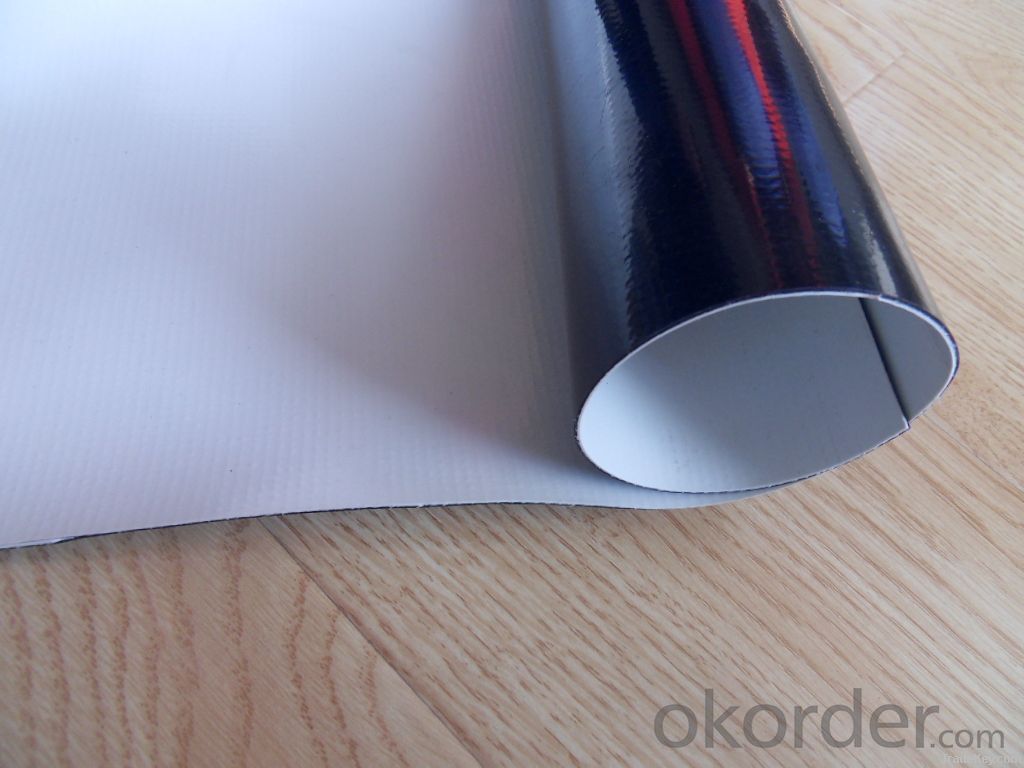
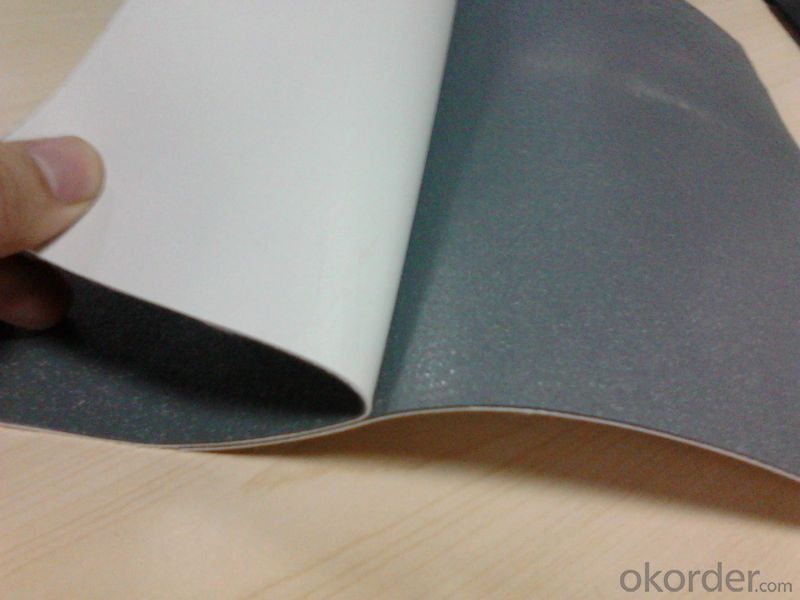
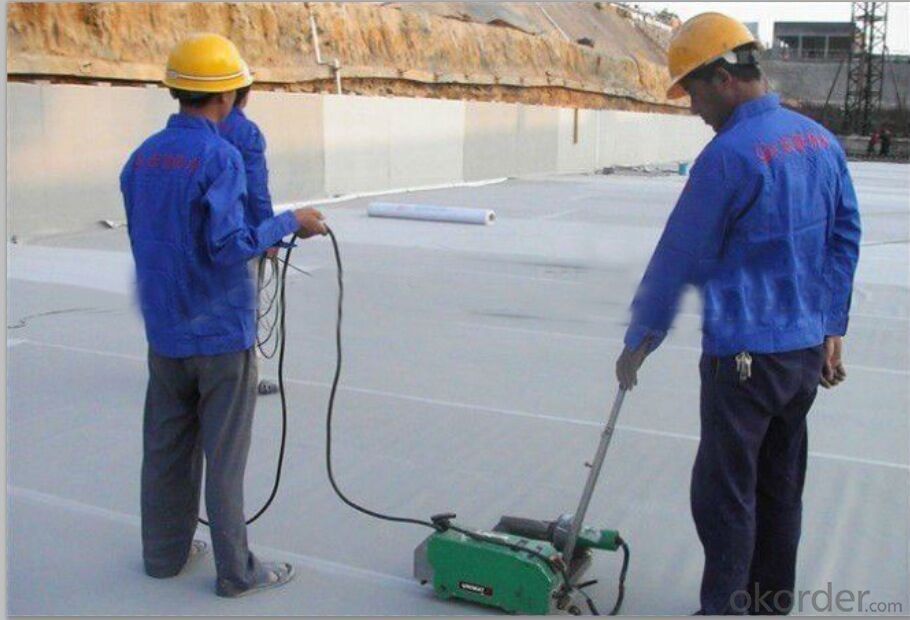
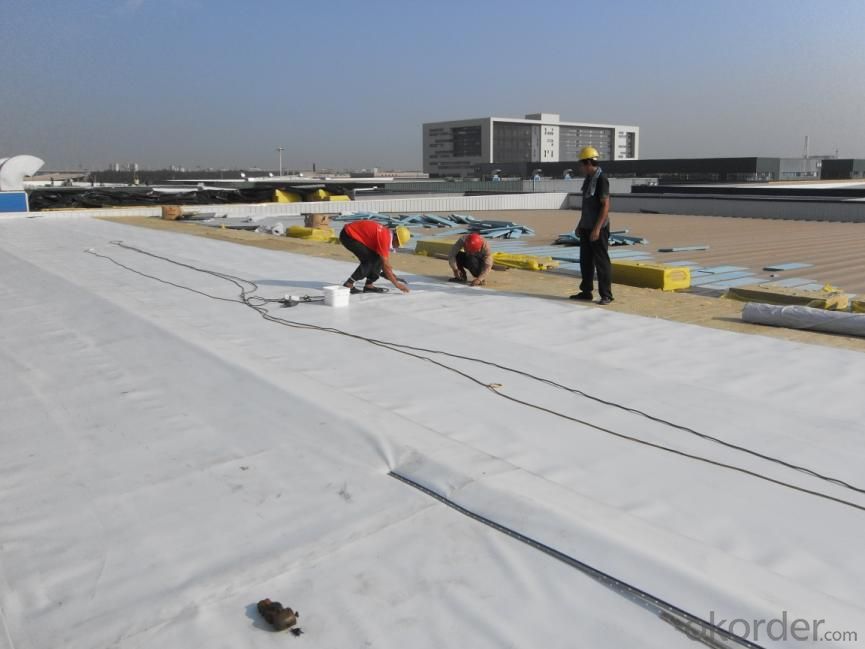
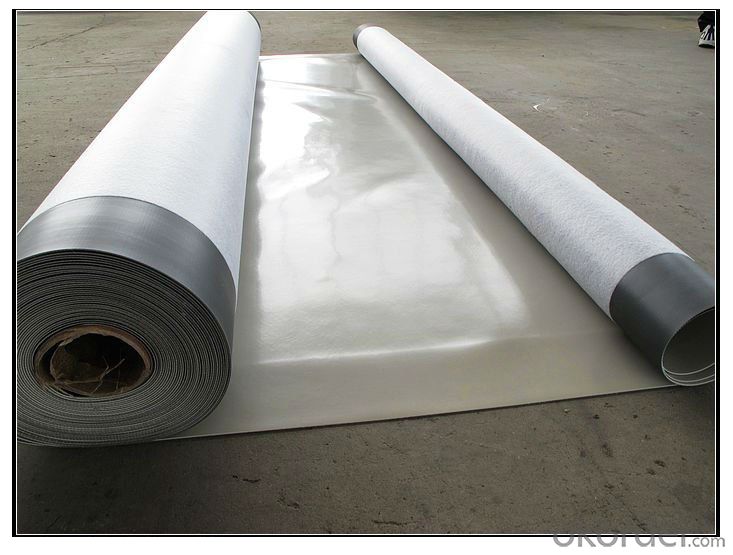
FAQ:
1. Can you produce 4m width?
Yes, no problem for us. We have four bases in China, largest one in this field.
2. How many quantity in one 20'' container for 1.2mm and 1.5mm?
480rolls, 11520m2 for 1.2mm and 400rolls, 9600m2 for 1.5mm
3. Can you provide free samples?
Yes, our samples are free, but express fees usually on buyer's account.
- Q: Are waterproofing membranes suitable for below-grade applications?
- Yes, waterproofing membranes are suitable for below-grade applications. These membranes are specifically designed to prevent water infiltration into basements, foundations, and other below-ground structures. They provide a protective barrier against groundwater, ensuring the integrity and longevity of the structure.
- Q: How does a waterproofing membrane handle water infiltration from above?
- The purpose of a waterproofing membrane is to prevent water infiltration from above. It achieves this by creating a barrier that is impermeable to water. Typically, the membrane is made of a durable and flexible material, such as rubber or asphalt, which is specifically designed to withstand exposure to water. When water comes into contact with the surface above the waterproofing membrane, it acts as a protective layer that stops the water from seeping through and reaching the underlying structure. The membrane effectively repels the water, ensuring that it does not enter the building or any other protected area. To further enhance its resistance to water, the membrane is often installed with overlapping seams and sealed using adhesive or heat to create a continuous and watertight barrier. This prevents any potential gaps or weak points where water could potentially seep in. In addition to its impermeability, a waterproofing membrane is also designed to handle water infiltration by providing drainage pathways for any accumulated water on its surface. This is achieved through the use of channels or slopes that direct the water away from the protected area, effectively draining it and preventing any damage caused by water accumulation. Overall, a waterproofing membrane is specifically engineered to handle water infiltration from above. It accomplishes this by creating a strong and impenetrable barrier, as well as providing effective drainage mechanisms to prevent water accumulation.
- Q: Can a waterproofing membrane be used in rooftop gardens or green roofs?
- Yes, a waterproofing membrane can be used in rooftop gardens or green roofs. It is an essential component to prevent water leakage and protect the underlying structure from moisture damage. The membrane acts as a barrier, preventing water from penetrating the roof and causing potential structural issues. This ensures that the rooftop garden or green roof remains well-maintained and functional.
- Q: Polyurethane and SBS membrane waterproof
- ?Asphalt waterproof material with natural asphalt, petroleum asphalt and coal asphalt as the main raw material, with good adhesion, plasticity, water resistance, corrosion resistance and durability. Asphalt has been used as a waterproof material for more than 100 years and is widely used in civil engineering. Since the 1930s, oil asphalt gradually replaced the other asphalt, has become the main varieties of asphalt. Asphalt oil felt for the tire waterproofing membrane. At present, the varieties of linoleum oil asphalt felt, coal asphalt felt, glass cloth linoleum, glass fiber mats linoleum and linen linoleum and so on. Some countries also develop heat-resistant linoleum, porous linoleum, hot melt linoleum and low-burned linoleum. Conventional paper tires Asphalt felt is still the main varieties of waterproofing membrane, the bonding material is hot asphalt or in the hot asphalt mixed with inorganic or organic modified materials prepared asphalt glue (Methanol)
- Q: Can a waterproofing membrane be used for a planter roof?
- Indeed, the utilization of a waterproofing membrane is applicable to a planter roof. The primary purpose of a waterproofing membrane lies in its ability to impede water infiltration, thus rendering it highly suitable for safeguarding the roof of a planter. By doing so, it effectively shields the underlying structure from water-related harm, encompassing potential leakages and decay caused by moisture. Furthermore, the implementation of a waterproofing membrane also aids in preserving moisture within the planter, thereby guaranteeing that plants obtain sufficient hydration.
- Q: Can a waterproofing membrane be used for a crawl space?
- Yes, a waterproofing membrane can be used for a crawl space. It can help prevent moisture from seeping into the crawl space, protecting the area from water damage and potential mold growth.
- Q: Does a waterproofing membrane require any specialized tools or equipment for installation?
- Specialized tools and equipment are typically necessary for the installation of a waterproofing membrane. To properly install the membrane, one must utilize various common tools and equipment. These include a trowel or roller for spreading the membrane, a utility knife for cutting and shaping the membrane, a heat gun or propane torch for activating and adhering the membrane, a seam roller for ensuring proper bonding of seams, and a caulking gun for applying sealant around penetrations and edges. Depending on the specific type of waterproofing membrane being installed, additional tools such as a primer, bonding adhesive, or specialized membrane fasteners may also be required. It is crucial to refer to the manufacturer's installation guidelines to guarantee the correct tools and equipment are utilized for a successful installation.
- Q: Can a waterproofing membrane be used on gypsum board surfaces?
- Yes, a waterproofing membrane can be used on gypsum board surfaces. Gypsum board, also known as drywall, is a common material used in interior construction. While it is not inherently waterproof, applying a waterproofing membrane can help protect the gypsum board from moisture damage. A waterproofing membrane is a thin layer of material that is applied to the surface of the gypsum board. It forms a barrier that prevents water from seeping into the board and causing it to deteriorate or mold. It can be used in areas where moisture is present, such as bathrooms, kitchens, laundry rooms, or basements. Before applying a waterproofing membrane, it is important to prepare the gypsum board surface properly. This may involve cleaning the surface, patching any holes or cracks, and ensuring the board is dry and free of dust. Once the surface is ready, the waterproofing membrane can be applied according to the manufacturer's instructions. It is worth noting that while a waterproofing membrane can provide some protection against moisture, it is not a guarantee against water damage. It is always important to address the source of water intrusion and ensure proper drainage and ventilation in any area prone to moisture. Additionally, it is recommended to consult with a professional or follow the manufacturer's recommendations when choosing and applying a waterproofing membrane to gypsum board surfaces.
- Q: Can a waterproofing membrane be used in areas with heavy foot traffic or vehicle loadings?
- Yes, a waterproofing membrane can be used in areas with heavy foot traffic or vehicle loadings. However, it is important to choose a membrane that is specifically designed for such applications to ensure durability and longevity. These specialized membranes are typically thicker and more resistant to wear and tear. Additionally, consideration should be given to the type of traffic or loading that the area will experience. For example, areas with vehicular traffic may require a membrane with higher compressive strength to withstand the weight of vehicles. In summary, while waterproofing membranes can be used in high-traffic or heavy loading areas, it is crucial to select the appropriate type of membrane that meets the specific demands of the application.
- Q: Can a waterproofing membrane be used on precast concrete block surfaces?
- Yes, a waterproofing membrane can be used on precast concrete block surfaces. It helps to prevent water penetration and protects the structure from potential damage caused by moisture.
Send your message to us
PVC Waterproofing Sheet in Polyester Reinforcement in 1.2mm
- Loading Port:
- Shanghai
- Payment Terms:
- TT OR LC
- Min Order Qty:
- 20000 m²
- Supply Capability:
- 5000000 m²/month
OKorder Service Pledge
OKorder Financial Service
Similar products
Hot products
Hot Searches
Related keywords
